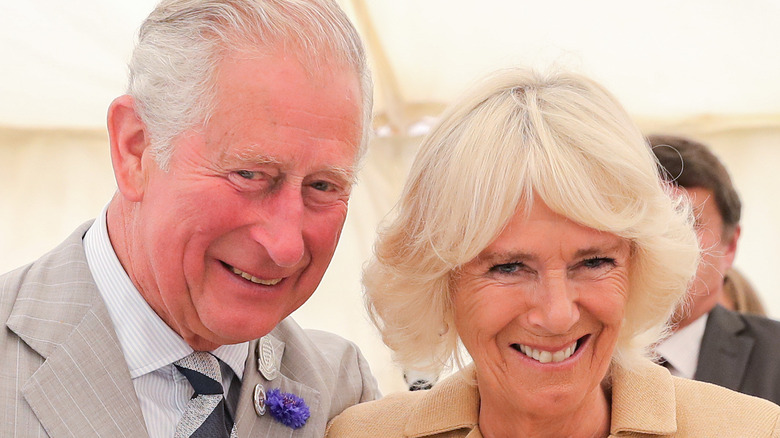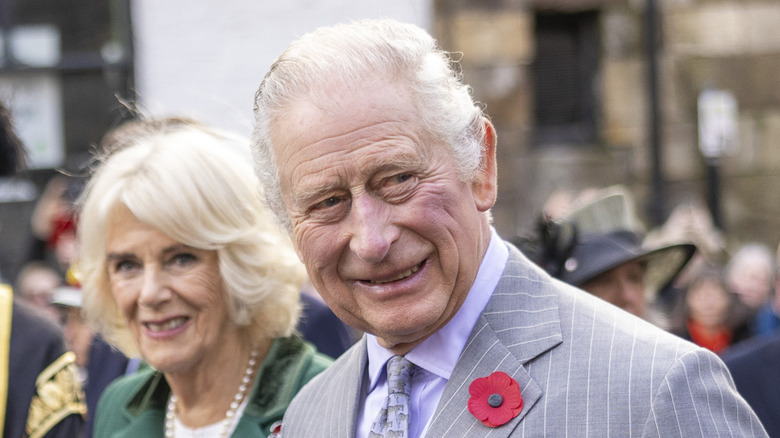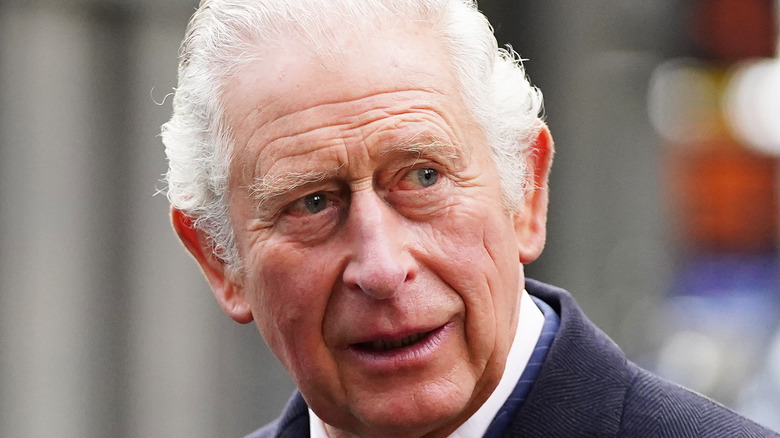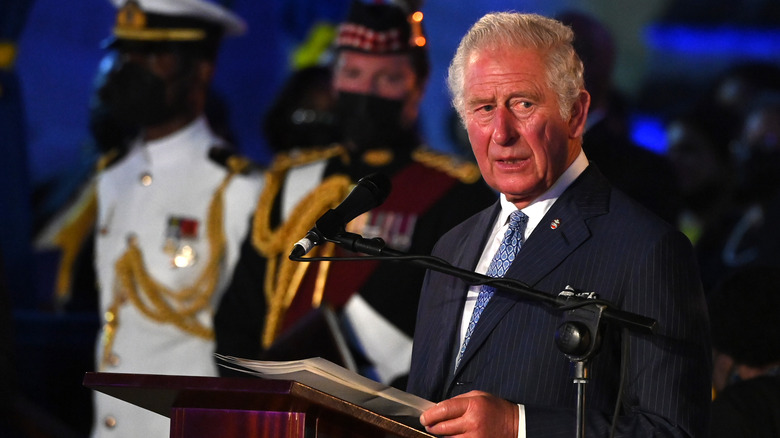Why King Charles And Queen Camilla Became The Victims Of An Angry Egg-Thrower
Due to their high-profile nature, royal appearances attract protestors in addition to well-wishers. Like all senior royals, King Charles and Queen Consort Camilla travel with royal bodyguards. In conjunction with local law enforcement, these personal protection officers help keep them safe. However, despite all the planning and careful security, sometimes the unexpected happens.
When it comes to protests, throwing eggs seems to be a recurring theme. The Guardian notes that eggs are a favorite choice among British protesters, and egg-throwing in England dates back to medieval times. Over the years, multiple incidences of royal egging have occurred. According to Reuters, in 2022, the late Queen Elizabeth II had eggs thrown at her car in Nottingham.
In addition, the queen and Prince Philip were egged and booed during a 1992 visit to Dresden, Germany, per The Telegraph. During a 1986 visit to New Zealand, Elizabeth got hit by eggs as she traveled in an open car (via AP News). Despite getting egg on her coat and dress, the queen used her surprising sense of humor to diffuse the situation. At a state banquet days after the incident, she quipped, "I myself prefer my New Zealand eggs for breakfast," per the Los Angeles Times.
For his part, Charles is no stranger to eggs at a royal appearance. When he visited Dublin in 1995, protesters targeted the then-prince with eggs (via Reuters). More recently, eggs became part of yet another royal outing.
The egg-thrower was protesting slavery
During a royal appearance at Micklegate Bar in York, King Charles III and Queen Consort Camilla were shaking hands and greeting people when a protester threw eggs at them. As reported by The Telegraph, the 23-year-old man was quickly apprehended by police, shouting, "this country was built on the blood of slaves" as he was arrested.
ITV's video of the incident shows the king calmly watching the first egg fly past and land on the ground near his feet. Despite the projectiles and some booing from the crowd, Charles remained unflappable and focused on his conversation. Meanwhile, some of the crowd started cheering, "God save the king!"
"Camilla sort of flinched a little bit when the booing started but they [police] quelled it really quickly," local gallery owner Kim Oldfield told the BBC. "Just a shame they spoilt what was a lovely moment." According to Express, the king and queen consort continued talking to the crowd after the protester's arrest.
Afterward, the royal couple unveiled a statue of the late Queen Elizabeth II. Located on the front of York's cathedral, the one-ton, seven-foot sculpture is the first statue to be dedicated since the heartbreaking death of the queen.
"Now, her image will watch over what will become Queen Elizabeth Square, for centuries to come — a constant example of the duty and care for others, and for our community, which is the calling and the duty we all share," Charles said, per People.
King Charles is already engaging in frank discussions about slavery
The Daily Mail reports that the egg-throwing protester was identified as Patrick Thelwell. According to his website, Thelwell is a gardener and Green Party candidate in York. He also mentions that he's a climate activist and intends to pursue a Ph.D. in interdisciplinary global development. Previously, Thelwell was fined £500 for participating in the Extinction Rebellion's London Bridge blockade (via Metro).
While Thelwell declared "this country was built on the blood of slaves" during his arrest, King Charles III has already begun taking active steps in holding open discussions on the topic. The day before the egg-throwing incident, the king met with Fiona Compton to view her slave-themed art exhibition, per The Telegraph.
Compton is Charles' goddaughter and the daughter of former St. Lucia Prime Minister Sir John Compton. "The project and conversations is about engaging British history in the slave trade and having open and meaningful conversations about it," Compton said, per the Mirror. Speaking of the king, Compton said, "He is ready to have active conversations about Britain's relationship with the slave trade."
Compton also noted that the king felt that this part of British history needed to be discussed. "In the same way we are taught about the Holocaust, we should be open about speaking about Britain's involvement in the slave trade," she added (via The Telegraph).
The monarch has addressed slavery in multiple speeches
In November 2021, then-Prince Charles traveled to Barbados as the country became a republic and ended British rule. During his speech, Charles took the opportunity to address the topic of slavery. "From the darkest days of our past, and the appalling atrocity of slavery, which forever stains our history, the people of this island forged their path with extraordinary fortitude," he said, per Town & Country.
This admission of Britain's involvement in slavery was a historic first for a royal appearance in the Caribbean. Charles also used similar language during a 2018 visit to Ghana. According to the Mirror, Charles' speech in Barbados was favorably received and called a "grown-up conversation led by a future king."
More recently, in June 2022, Charles also referenced slavery when he attended the Commonwealth Heads of Government Meeting. "I want to acknowledge that the roots of our contemporary association run deep into the most painful period of our history," he said, per CNN. "I cannot describe the depths of my personal sorrow at the suffering of so many, as I continue to deepen my own understanding of slavery's enduring impact."
As reported by The Telegraph, during that same time, Charles was utilizing his royal connections to promote diversity and engage a charitable organization to educate the public on the topic of slavery.



